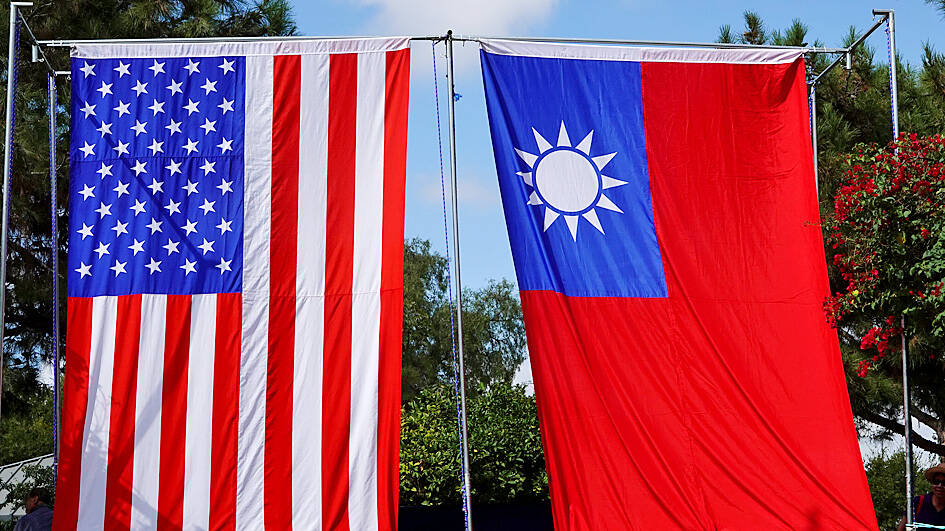Cyberwarfare and the safety of key infrastructure are expected to be the top issues discussed at the annual US-Taiwan Defense Industry Conference, which started in Williamsburg, Virginia, today.
The semi-official three-day conference, which has been held since 2012, is a key event for defense and security officials from Taiwan and the US to exchange thoughts and views on threats and challenges in the Taiwan Strait.
The US-Taiwan Business Council, which organized the event, said that American Institute in Taiwan (AIT) Chair Laura Rosenberger; retired admiral Scott Harbinson Swift, former commander of the US Pacific Fleet; retired lieutenant general Steven Rudder, former commanding general of the US Marine Corps Forces, Pacific; and former US assistant secretary of defense for Indo-Pacific Security Affairs Randall Shriver would be attending the event.

Photo: CNA
The delegation from Taiwan, led by Deputy Minister of National Defense Po Hung-hui (柏鴻輝), includes Su Tzu-yun (蘇紫雲), director of the Institute for National Defense and Security Research’s Division of Defense Strategy and Resources; retired lieutenant general Mike Tien (田在勤); retired admiral Richard Chen (陳永康); and Taiwan Security Analysis Center Director Mei Fu-shing (梅復興).
Panelists are to discuss issues including the Ukraine war, the most serious threats and emerging threats Taiwan faces and supply chain challenges that could negatively affect the ability of the US and Taiwan to meet identified threats.
Other key issues include how the US’ view of Taiwanese defense policy is changing, and how that might change after elections in Taiwan and the US next year.
There are also to be sessions focusing on gaps in Taiwan-US defense cooperation, cybersecurity as an emerging but crucial front in the event of a cross-strait conflict and the role that strategic paralysis of Taiwan’s critical infrastructure might play in a potential conflict.
The conference was held online in 2020 due to the COVID-19 pandemic.
In 2021, Major General Yu Chien-feng (余劍鋒), then director-general of the Defense Mission at the Taipei Economic and Cultural Representative Office in the US, served as Taiwan’s representative to the event.
A delegation was sent to the conference last year for the first time since 2020, led by then-deputy minister of national defense Wang Shin-long (王信龍).

The Central Election Commission has amended election and recall regulations to require elected office candidates to provide proof that they have no Chinese citizenship, a Cabinet report said. The commission on Oct. 29 last year revised the Measures for the Permission of Family-based Residence, Long-term Residence and Settlement of People from the Mainland Area in the Taiwan Area (大陸地區人民在台灣地區依親居留長期居留或定居許可辦法), the Executive Yuan said in a report it submitted to the legislature for review. The revision requires Chinese citizens applying for permanent residency to submit notarial documents showing that they have lost their Chinese household record and have renounced — or have never

A magnitude 5.6 earthquake struck off the coast of Yilan County at 12:37pm today, with clear shaking felt across much of northern Taiwan. There were no immediate reports of damage. The epicenter of the quake was 16.9km east-southeast of Yilan County Hall offshore at a depth of 66.8km, Central Weather Administration (CWA) data showed. The maximum intensity registered at a 4 in Yilan County’s Nanao Township (南澳) on Taiwan’s seven-tier scale. Other parts of Yilan, as well as certain areas of Hualien County, Taipei, New Taipei City, Taoyuan, Hsinchu County, Taichung and Miaoli County, recorded intensities of 3. Residents of Yilan County and Taipei received

Taiwan has secured another breakthrough in fruit exports, with jujubes, dragon fruit and lychees approved for shipment to the EU, the Ministry of Agriculture said yesterday. The Animal and Plant Health Inspection Agency on Thursday received formal notification of the approval from the EU, the ministry said, adding that the decision was expected to expand Taiwanese fruit producers’ access to high-end European markets. Taiwan exported 126 tonnes of lychees last year, valued at US$1.48 million, with Japan accounting for 102 tonnes. Other export destinations included New Zealand, Hong Kong, the US and Australia, ministry data showed. Jujube exports totaled 103 tonnes, valued at

BIG SPENDERS: Foreign investors bought the most Taiwan equities since 2005, signaling confidence that an AI boom would continue to benefit chipmakers Taiwan Semiconductor Manufacturing Co’s (TSMC, 台積電) market capitalization swelled to US$2 trillion for the first time following a 4.25 percent rally in its American depositary receipts (ADR) overnight, putting the world’s biggest contract chipmaker sixth on the list of the world’s biggest companies by market capitalization, just behind Amazon.com Inc. The site CompaniesMarketcap.com ranked TSMC ahead of Saudi Aramco and Meta Platforms Inc. The Taiwanese company’s ADRs on Tuesday surged to US$385.75 on the New York Stock Exchange, as strong demand for artificial intelligence (AI) applications led to chip supply constraints and boost revenue growth to record-breaking levels. Each TSMC ADR represents